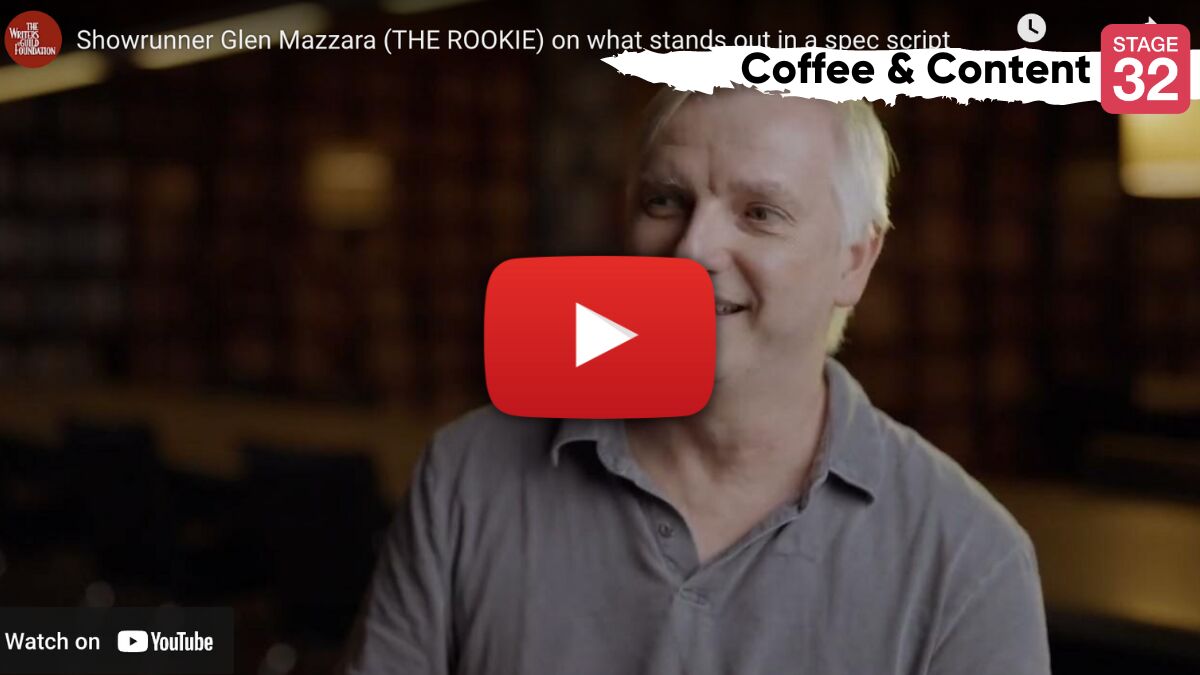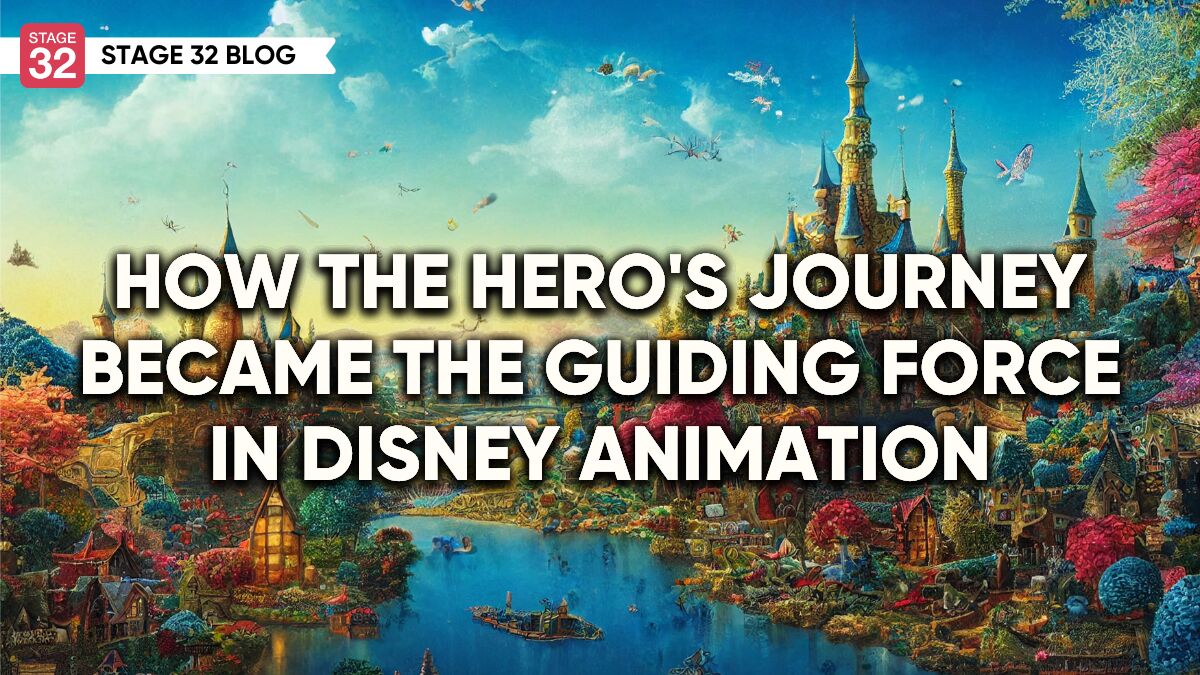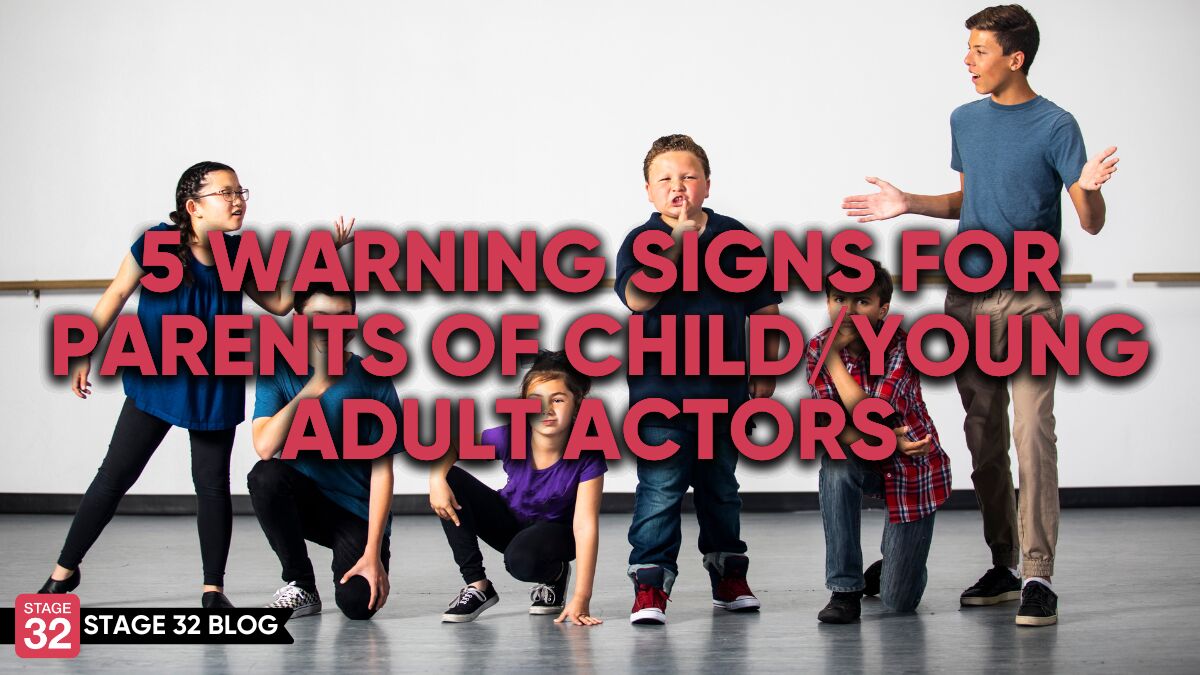5 Warning Signs For Parents Of Child/Young Adult Actors
Let's set the records straight for parents of young, and specifically, young adult actors (~16-24) in the entertainment industry. While there is a lot of content about sexual predators in the Industry, there’s very little about other types of abusive, manipulative, and predatory behaviors involving young actors.
In an unnatural arena where profit, investment, careers, and social status rely on our kids more than ever, we, as parents, need to remain vigilantly aware that while “magic” exists in entertainment, the industry itself is notoriously one of the worst businesses to be in, largely driven by ulterior motives, inefficient practices, spin, and falsified data. Navigating the smoke and mirrors is difficult enough for adults (even with years of experience and a law degree). But, for young, impressionable actors it’s far too easy to fall prey to the sleight of hand.
Here are 5 ways in which a young actor can be manipulated.

1) INTERFERENCE IN PERSONAL/PROFESSIONAL RELATIONSHIPS: ADULTS WHISPERING IN THEIR EARS
Years ago, I had a long meeting with my (then 10-year-old) daughter’s theatrical agent. Somewhere in the conversation, the agent warned me about some of the parental pitfalls that lay ahead, particularly when my daughter got older. She explained that as young actors hit young adulthood, the rules start to change. The actor is now “fair game.” Not only will people in the industry (producers, reps, etc.) try to interfere with the young actor’s professional relationships, but they will interfere with her personal relationships as well. She explained that by putting a wedge between the young actor and those closest to them, the actor is easier to manipulate and control. She went on to cite multiple examples involving very recognizable names over her decades of experience in the industry.
Here’s how this often plays out:
An adult (producer, director, actor, rep, etc.) on a project says they’re going to take the younger actor “under their wing.” This person goes on to question how the younger actor’s career is being handled, suggesting they’re doing things wrong, and/or challenging work principles or family values. This “mentoring” may be for self-benefit (such as aligning with a rising star or getting the young actor on board for other projects), or it may be driven by bitterness, control, ego, etc. On the less nefarious end, maybe this person is simply trying to be that cool, older adult attempting to “bond.” (Hmmmmm … “Imagination is the only weapon in the war with reality.”) In any event, the person preys on the young actor’s falsely placed adulation or respect and then suggests that the young actor separate from any outside influence that isn’t aligned with their newly inspired vision. Wedge created.
Those closest to the young actor suddenly find themselves dealing with (or cut off from) a young person who is struggling to find identity in a landmine of “bad actors.” Not only is this damaging to the young actor, it can be devastating to those who genuinely have the young actor’s best interests at heart … as a person.
Don’t get me wrong. There are plenty of inspiring, creative people working in the industry as well, but remove the blinders. This business is notoriously filled with false promises, pernicious pretenses, and questionable characters who “fake it until they make it” (or more typically – don’t.)
Too extra-extra? Don’t bet on it. It's the camel’s nose under the tent. BEWARE of what other adults are whispering in your young actor’s ear.

2) ACTING COACHES & EMOTIONALLY SENSITIVE EXPERIENCES
Back in the day, our parents warned us against “airing our dirty laundry.” (Privacy, anyone?) Fast forward to today. We have YouTubers and 25-year-old “life coaches” talking about “being your authentic self.” Parents are left trying to explain the difference between authenticity and publicly spewing out every private and personal detail of one’s life – which we all know ultimately comes back to bite you in the... (OK, OK…breathing exercises).
As if walking that tightrope wasn’t daunting enough, the entertainment industry throws in another twist…acting coaches.
Acting coaches (who, btw, need no prerequisites for using this title) are also looking for “authenticity” and typically try to find it by delving into the inner workings of a young actor’s thoughts, feelings, experiences, and emotions. Again, all this is without any professional requirements.
Tasked with tapping into potentially difficult emotions in an effort to make performances more “real,” young actors are put in an untenable situation. (I mean, what could go wrong?) Worse still is the fact that some coaches actually encourage young actors to share every detail of their private, personal experiences in order to provide the coach with “trigger words” that can be used to elicit specific emotional responses during performances … all in the name of “art.” (Sounds like good times for young minds.)
Even without a psych degree, it’s easy to see the risks involved and the potential damage that could be done. Opening up to an acting coach in the same way one might open up to a therapist is probably not in anyone’s best interest ... particularly since "acting coaches” DO NOT HAVE A DUTY OF CONFIDENTIALITY.
Try to explain this to your young actor. While it’s guaranteed to be a conversation (or a screaming match) full of lots of pushback, it’s well worth the effort.

3) "THEY’RE OLD ENOUGH TO BE ON SET ALONE"
Short version: NO. If anyone takes issue with this, it’s a red flag.
Back when I first moved to LA, even the most non-stage-parenty parents (as well as production crew members) warned me never to leave my daughter alone on set.
How many horror stories do we need to read on this subject? You cannot expect other parents who happen to be on set to watch out for your child. It's not their responsibility. Nor can you rely on set teachers. I’ve seen this go wrong a number of different ways over the years. Set teachers are typically less attentive and more over-tasked than you’d expect. The only way to ensure your young actor’s safety is to be a constant presence. If you can’t be, make sure you have a reliable substitute. Even if you have an 18+ year old actor who is uncomfortable being on set alone, be there.
Last note on this subject: If you get wind that a producer or other member of the production team specifically has an issue with dads being on set (versus moms), it’s a whole different kind of red flag.
4) IT'S A STANDARD CONTRACT
Assume there is no standard contract.
Very early on, my daughter was sent out on a short shoot (maybe 3 hours) for use in an awards show with about 15 other kids. Production was in a rush to start, so they didn’t bother sending out the contract in advance. It was provided on set; and it was possibly the longest acting contract I've reviewed to date (including one for a regular on GLEE).
Every other parent flipped past the 20+ pages and signed without reading text buried in paragraphs giving away rights to things like use of the actor’s image, voice, and likeness, in perpetuity, for any purpose beyond the project itself, whatsoever.
If you can't read the agreement, don’t sign the agreement.
(Incidentally, this was just for featured extra work on a 5-minute spot during Nick KCAs.)

5) THE GOSSIP TRAP: TIPS FROM OTHER PARENTS
When I’m on set as a parent, I’m just “the Dad,” but my bio is kind of unusual. I’ve produced and written content, pitched shows here and in Cannes, helped cast a show, covered red carpets, and handled social media campaigns for TV & online shows. I’m also a technology, IP, and entertainment attorney.
I’ve learned a lot about the trade from that “Dad” role though. Sitting back and watching how different productions are run and connecting with people in all aspects of the business has a lot of value. Gossiping with other parents, does not.
Best advice: Steer clear of it!
First of all, you have to assume that you’re in earshot of everyone on the production team because most likely, you are. From open mics to that young PA in the corner who’s focused on the call sheet, you’re on deck. What you say and what you do is heard and observed by…well, everyone!
Second, the gossip runs beyond parents grouped together complaining that lunch is running 15 minutes late (true story.) I’ve heard some of the worst advice/suggestions pass from one parent to another on set under the guise of “helping.” Let’s run through a few real examples for added value:
- “Your kid doesn’t need to go out for every role the agent sends over.”
To some extent this is true. If your kid is white as a ghost and your ancestry goes back to mid-century England, they shouldn’t audition for a role meant for someone of Hispanic descent. The same holds true if the project is promoting something that runs strongly against your values. By all means, pass it up. On the other hand, if you (or your kid) just don’t feel like schlepping to another audition…or self-taping…or trying out for lesser roles, you might just be in the wrong business. Agents and managers have time and money invested in you. If you don’t submit, there is no ROI for your reps. Don’t say “no” for the casting directors.
(NOTE: If an agent constantly sends your kid out for roles that are never a fit, speak up or search for representation elsewhere before you end up with no representation and a reputation for having a bad work ethic.)
- “I’ll refer you to my kid’s manager.”
Be very careful here! I’ve personally seen this backfire. A Mom on a set had taken it upon herself to refer another young actor to a management company without speaking to the actor’s parent. When the referred actor’s parent called the manager, representation was refused because the referring Mother was engulfed in a huge argument over her own son’s representation. OOF!

- “You don’t need to do social media.”
Seriously? Look at who’s being cast these days. Outside of smaller indie films, almost every project with a decent budget looks at social media following. Recent Disney/Nick shows have been developed around kids with social media popularity (often with little regard for any acting ability.) If the producer doesn’t care about social media, you can bet the investors or distribution company does!
Social media is a free tool to help build awareness and presence. The emotional and mental health aspects of social media are a subject for another article. Keep the word “tool” in mind when thinking about social media and how to use it in a way that will best serve your interests. Actors have never had more ability to build their own careers and handle their own publicity.
- “Ohhh, your agent didn’t send you out for that role?”
This is poisonous all around. First of all, you’ve already gotten too far into the discussion (gossip) if this has come up. There could be many reasons why your young actor wasn’t submitted - from appearance to availability to personal connections and beyond. Sometimes, roles are only sent to specific agencies. If your young actor is interested in a role and you have a good team, you should be able to ask their agent or manager about it.
FINAL THOUGHTS
We can love the “true” magic, inspiration, and escapism the entertainment industry creates, but as parents of impressionable young actors, we can’t afford to turn a blind eye to the darker realities prevalent in the industry as well.
Stay close. Be present. Pay attention. And talk to your kids.
If you have any questions, please don't hesitate to reach out! @adamfeinsilver on all social.
Let's hear your thoughts in the comments below!
Got an idea for a post? Or have you collaborated with Stage 32 members to create a project? We'd love to hear about it. Email Emily at blog@stage32.com and let's get your post published!
Please help support your fellow Stage 32ers by sharing this on social. Check out the social media buttons at the top to share on Instagram @stage32 Twitter @stage32 Facebook @stage32 and LinkedIn @stage-32
| Coffee & Content: Showrunner Glen Mazzara On What Stands Out In A Spec Script |
| How The Hero's Journey Became The Guiding Force In Disney Animation |
Search Stage 32 Blog
There are now 3695 blog posts for you to enjoy. Search them all by tags below.
Acting, Advice, Cinematography, Coffee & Content, Composing, Contests, Distribution, Featured, Filmmaking, Financing, Inspirational, Networking, Producing, Screenwriting, Success Stories, Tips, Trending,Relevant Tags
Recommended Articles

The Economics of Short Films
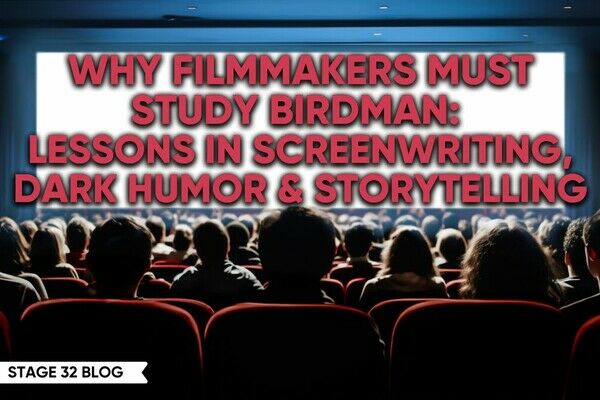
Why Filmmakers Must Study Birdman: Lessons in Screenwriting, Dark Humor, and Storytelling
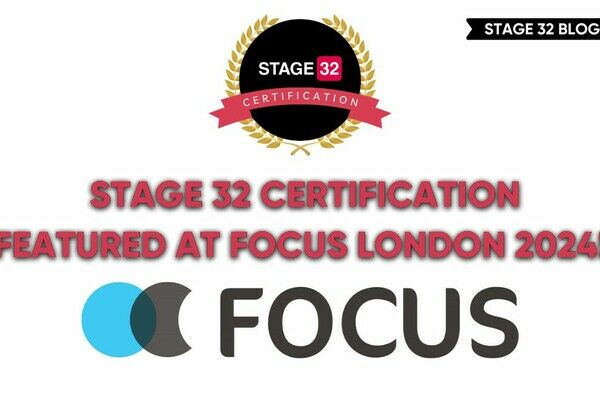
Stage 32 Certification at Focus London 2024!

3 Ways Acting Has Helped Me Become A Better Writer

How Did You Get That Gig?

Happy New Year! Let's Talk Goals!

Celebrate the December 2024 Stage 32 Community’s Successes

The Rise & Struggle of Independent Filmmakers: Sustaining Creativity in a Studio-Dominated World
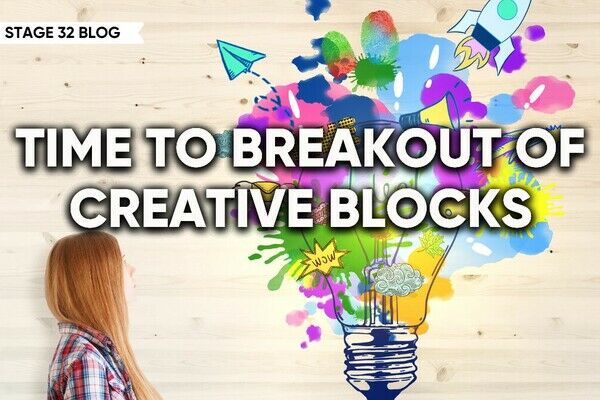
Time To Breakout Of Creative Blocks



